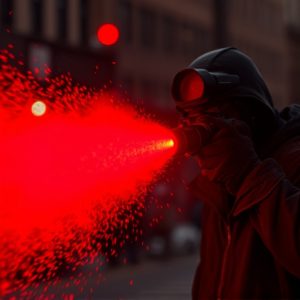Can Pepper Spray Cause Temporary Blindness? An In-Depth Look at Its Vision and Physiological Impacts
Pepper spray, such as oleoresin capsicum (OFC), can cause temporary blindness by rapidly triggering…….
Pepper spray, such as oleoresin capsicum (OFC), can cause temporary blindness by rapidly triggering intense pain and severe lacrimation upon contact with the eyes. The active ingredient, capsaicin, overstimulates sensory neurons, leading to swelling of the eyelids and conjunctiva that can obstruct vision. This reaction results in a hazy visual environment and can cause individuals to be unable to open their eyes due to pain for up to 45 minutes. The impact on sight is not only due to physical blockage but also because of the reflexive responses to the pain, which can also induce temporary blindness. While full recovery is typically expected within 15 minutes to several hours, with discomfort subsiding over time, the severity and duration of vision impairment can vary based on exposure conditions. It's important for individuals to understand that while pepper spray can lead to temporary blindness, its effects are generally reversible and it serves as a potent self-defense tool or crowd control measure. Can pepper spray blind you? It has the capacity to do so under certain circumstances, particularly with high concentrations and prolonged exposure.
Considering the potential consequences of using pepper spray in self-defense or law enforcement, this article delves into the profound impact it has on both vision and physiological systems. Known colloquially as “pepper spray,” this irritant can temporarily incapacitate an individual, raising critical questions about its use and effects. We will explore how pepper spray interacts with the eyes to cause severe pain and temporary blindness, as well as its broader physiological implications, providing a comprehensive understanding of its potency. Understanding “can pepper spray blind you” is crucial for anyone considering its deployment in high-stress situations.
Understanding the Impact of Pepper Spray on Vision
Exposure to pepper spray, a common self-defense and crowd control agent, can have immediate and profound effects on an individual’s vision. The active ingredient in pepper spray, capsaicin, is derived from chili peppers and induces a burning sensation in the eyes upon contact. This irritant targets the pain receptors in the eye, triggering a cascade of responses that can temporarily impair visual function. Within seconds of exposure, affected individuals experience intense pain, tears streaming down their cheeks, and an involuntary closing of their eyelids due to the stimulation of sensory neurons. The lacrimation response is part of the body’s protective mechanism against irritants but can obscure vision by creating a haze over the eyes, further reducing visual acuity. The inflammatory reaction caused by capsaicin can also lead to swelling of the eyelids and conjunctiva, which may temporarily blind an individual by obstructing their line of sight. In severe cases, the effects can last for up to 45 minutes, depending on factors such as wind, ventilation, and the amount of spray encountered. Understanding these ocular effects is crucial for recognizing the potential risks associated with pepper spray exposure and for taking appropriate safety measures in environments where such agents may be used. It is also essential for medical professionals to provide accurate information regarding the severity and duration of vision impairment caused by pepper spray, as this can significantly impact an individual’s ability to defend themselves or react in a crisis situation.
The Physiological Effects of Pepper Spray and Potential for Temporary Blindness
Exposure to pepper spray, also known as oleoresin capsicum (OFC) or capsaicin, can trigger a potent physiological response. The active component of the spray binds with sensory receptors in the eyes and mucous membranes, leading to an intense burning sensation. This reaction causes the eyes to close reflexively due to the pain, effectively resulting in temporary blindness. The lacrimal glands activate in a response known as “lacrimation,” flooding the eyes with tears in an attempt to flush out the irritant. The conjunctiva, the transparent mucous membrane covering the front of the eyeball and the inside of the eyelids, becomes inflamed, swollen, and red, further obscuring vision. In addition to visual impairment, individuals may experience respiratory difficulties as the spray can also affect the nasal passages and throat, leading to coughing and difficulty in breathing. The effects of pepper spray are reversible once the exposure ceases, but the discomfort can last from 15 minutes to half an hour or more, depending on the concentration of the spray and the environmental conditions at the time of exposure. Can pepper spray blind you? While temporary blindness is a potential effect, it is not a guaranteed outcome; however, the debilitating effects are significant enough that pepper spray is widely used as a non-lethal means for self-defense and crowd control.


